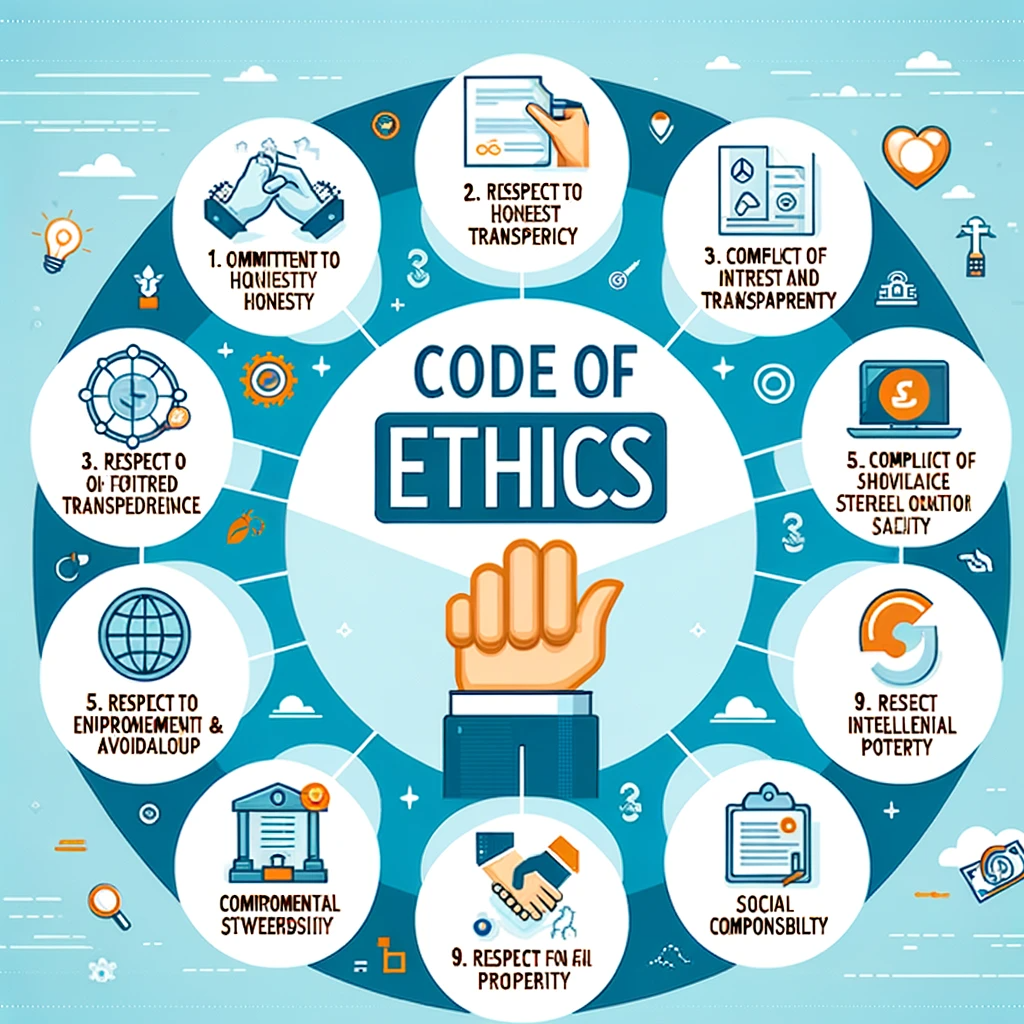Ethics in the context of business refers to the code of ethics for business owners principles and values that guide the behavior and decision-making processes of individuals and organizations in the business environment. These principles are foundational to how business is conducted and are often centred on concepts of honesty, integrity, fairness, respect, transparency, and accountability. Business ethics encompasses both the moral guidelines that individuals within an organization follow and the collective values that define an organization’s culture.
Table of Contents
Importance
The importance of ethics for business owners cannot be overstated. Adhering to a strong ethical code serves multiple vital functions:
- Building Reputation: Ethical behavior builds and maintains a positive reputation. A good reputation attracts customers, investors, and potential employees. In contrast, unethical practices can lead to negative publicity, loss of customer trust, and legal issues, all of which can severely damage a company’s reputation and viability.
- Establishing Trust: Trust is the foundation of all business relationships, including those with customers, employees, suppliers, and other stakeholders. By operating ethically, business owners establish trust, which is critical for creating loyal customer bases, maintaining good relationships with suppliers, and fostering a positive workplace environment.
- Ensuring Long-Term Success: While unethical practices might offer short-term gains, they are unsustainable in the long run. Ethical business practices contribute to the long-term success and sustainability of a business. They help in mitigating risks, avoiding legal issues, and ensuring compliance with regulations.
Ethics are not just moral obligations but are also practical necessities for business owners. Upholding a code of ethics is essential for building a successful, respected, and sustainable business.
Fundamental Principles
Honesty and Transparency
Honesty and transparency are cornerstones of ethical business conduct. Being honest with customers, employees, and stakeholders means providing accurate and complete information about products, services, and business operations. This transparency builds trust and credibility, ensuring that all parties involved can make informed decisions. When business owners are open about their practices and acknowledge their limitations or mistakes, they foster a culture of trust and respect. This approach not only strengthens customer loyalty but also boosts employee morale, as employees are more likely to feel valued and motivated in a transparent work environment.
Accountability
Accountability is a critical aspect of ethical business practice. Business owners must take responsibility for their actions and decisions, including the outcomes and repercussions of those decisions. This responsibility extends to ensuring that their business practices comply with legal and ethical standards. Accountability also involves being answerable to stakeholders, which means being open to scrutiny and willing to make amends or changes when necessary. An accountable business owner leads by example, setting a tone of integrity and responsibility throughout the organization.
Fairness
Fairness is about treating employees, customers, competitors, and other stakeholders with impartiality and justice. In practice, this means offering equal opportunities, avoiding discrimination, and being equitable in dealings with all parties. Fair business practices include fair pricing, honest marketing, and equitable treatment of employees, which covers fair wages, benefits, and working conditions. Fairness also extends to competition; ethical business owners respect their competitors and refrain from unfair practices such as monopolistic behaviors or industrial espionage. By upholding fairness, business owners not only adhere to ethical standards but also contribute to a healthy, competitive business environment.
The fundamental principles of honesty, accountability, and fairness are vital for maintaining ethical standards in business. They are not just moral guidelines but practical tools for building a sustainable, reputable, and successful business.
Ethics in Practice
Customer Relations
Ethical interaction with customers is paramount in business. Key guidelines include:
- Respecting Privacy: Protecting customer data and respecting their privacy is a crucial ethical obligation. This means not only complying with privacy laws but also being transparent about data collection and usage, and ensuring robust data security measures.
- Honesty in Advertising: All marketing and advertising efforts should be truthful and not misleading. This includes providing accurate descriptions of products or services, being clear about pricing, and avoiding deceptive promotions.
Employee Treatment
Ethical treatment of employees is essential for a healthy work environment. Key areas to focus on include:
- Fair Labor Practices: This includes providing fair wages, ensuring safe working conditions, and respecting workers’ rights. It also involves adhering to labor laws and regulations.
- Respect for Diversity: Embracing diversity and inclusivity in the workplace is not only a legal requirement but an ethical one. This means hiring and promoting without discrimination and fostering a culture that values and respects differences in background, perspective, and experience.
- Creating a Positive Work Environment: This involves more than just meeting basic legal requirements. It includes providing opportunities for professional growth, recognizing and rewarding good work, and encouraging a balanced work-life integration.
Sustainable Practices
Business owners have a responsibility towards environmental sustainability. This includes:
- Minimizing Environmental Impact: Implementing practices that reduce waste, conserve resources, and minimize carbon footprint. This can range from simple measures like recycling and energy-efficient lighting to more significant initiatives like investing in renewable energy sources or sustainable supply chains.
- Promoting Sustainability: Beyond internal practices, businesses can also influence their customers and partners to adopt sustainable practices. This could involve offering eco-friendly products, using sustainable packaging, or educating stakeholders about environmental impact.
By incorporating these ethical practices into daily business operations, owners not only adhere to moral principles but also contribute to a more sustainable, equitable, and prosperous society. Ethics in practice are not just about avoiding harm but actively doing good, creating a ripple effect that extends beyond the immediate business environment.
Ethical Challenges
Navigating Gray Areas
In business, there are often situations where the ethical course of action isn’t immediately clear, presenting what are known as “gray areas.” To navigate these effectively:
- Seek Multiple Perspectives: Consult with a diverse group of stakeholders, including employees, legal advisors, and industry peers. Different perspectives can provide insights that clarify the ethical implications of a decision.
- Refer to Ethical Codes and Principles: Use established ethical codes and principles as a guide. These can serve as a compass when the path isn’t clear.
- Consider Long-term Impacts: Evaluate the long-term consequences of actions, not just immediate gains or losses. Often, what seems beneficial in the short term may have negative long-term effects.
Global Considerations
Maintaining ethical standards across different cultures and legal systems is challenging due to varying norms and regulations. To address this:
- Understand Local Norms and Laws: Conduct thorough research into the cultural practices and legal requirements of each region where the business operates. This understanding is crucial for making informed, respectful decisions.
- Develop a Universal Ethical Framework: While specifics may vary, having a core set of ethical standards that applies across all operations can provide consistency and clarity.
- Adapt and Respect Local Practices: Be willing to adapt business practices to align with local customs and expectations, as long as they do not conflict with fundamental ethical principles.
Technology and Ethics
The digital age, especially with the advent of AI, presents unique ethical challenges:
- Data Privacy and Security: With the increasing amount of data collected, ensuring the privacy and security of this data is paramount. This includes ethical handling of customer data and transparent data practices.
- Bias in AI and Algorithms: Be vigilant about potential biases in AI algorithms. Regular audits and updates can help ensure that AI-driven decisions are fair and unbiased.
- Ethical Use of Technology: Consider the ethical implications of using certain technologies. For instance, surveillance technologies should be used in ways that respect individual privacy and freedom.
Navigating ethical challenges in business requires a combination of adherence to core principles, awareness of the changing landscape, and a willingness to adapt and learn. These challenges are not just hurdles to overcome but opportunities to reinforce the commitment to ethical practices and to strengthen the trust and integrity upon which successful businesses are built.
Implementing an Ethical Code
Setting Standards
Creating and implementing an ethical code within a business involves several key steps:
- Define Core Values: Identify the core values that reflect the business’s ethical priorities. These could include integrity, fairness, respect, and responsibility.
- Develop Clear Policies: Based on these core values, develop clear, practical policies that guide behavior and decision-making. These policies should cover various aspects of the business, from employee conduct to customer relations and supplier interactions.
- Involve Stakeholders: Include input from various stakeholders in the development of the ethical code. This can ensure that the code is comprehensive and aligned with the needs and expectations of all parties involved.
- Communicate and Document: Clearly communicate the ethical code to all employees and stakeholders. Ensure that it is easily accessible, for example, by including it in employee handbooks or on the company intranet.
Training and Awareness
Training employees on ethical standards is crucial for effective implementation:
- Regular Training Sessions: Conduct regular training sessions to educate employees about the ethical code and its practical implications in their daily work.
- Real-world Scenarios: Use real-world scenarios and case studies to illustrate how the ethical code applies in different situations.
- Promote a Culture of Ethics: Beyond formal training, foster a workplace culture that values and encourages ethical behavior. This can be achieved through leadership by example, open discussions about ethics, and recognition of ethical behavior in the workplace.
Monitoring and Enforcement
To ensure compliance with ethical standards:
- Establish Monitoring Mechanisms: Implement systems to regularly monitor compliance with the ethical code. This could include audits, surveys, and feedback mechanisms.
- Create Reporting Channels: Establish clear, confidential channels through which employees can report ethical concerns or violations. These channels should protect employees from retaliation.
- Enforce Consistently: Apply the ethical code consistently across all levels of the organization. When violations occur, enforce the code through appropriate disciplinary actions. This enforcement must be fair and consistent to maintain the integrity of the ethical code.
Implementing an ethical code is not a one-time event but an ongoing process. It requires commitment from the top levels of management down to every employee. By setting clear standards, providing comprehensive training, and ensuring robust monitoring and enforcement, a business can embed ethical practices into its core operations, fostering a sustainable and trustworthy organization.
Case Studies
Case Study 1: Ethical Leadership in Crisis Management
Situation: A tech company faced a significant data breach, potentially exposing customer data.
Ethical Challenge: The company had to decide whether to disclose the breach immediately, risking its reputation and shareholder value, or to delay the announcement until more information was gathered.
Action Taken: The company chose to promptly inform its customers and the public about the breach, accepting responsibility and outlining steps to mitigate the damage and prevent future incidents.
Outcome: Although the company’s stock initially dropped, its transparent and responsible handling of the situation led to a recovery in its reputation. Customers appreciated the honesty, and the company reinforced its commitment to ethical practices.
Case Study 2: Fair Labor Practices in Supply Chains
Situation: A clothing retailer discovered that one of its suppliers was violating labor laws, underpaying workers, and maintaining poor working conditions.
Ethical Challenge: The retailer had to decide whether to continue the relationship with the supplier to maintain profit margins or to find a new supplier, potentially incurring higher costs.
Action Taken: The retailer chose to terminate the contract with the unethical supplier and partnered with a new one that adhered to fair labor practices, even though this decision increased their production costs.
Outcome: The move enhanced the retailer’s brand image as an ethical and socially responsible business. Customers responded positively, leading to increased brand loyalty and sales over time.
Case Study 3: Implementing Sustainable Practices
Situation: An automobile manufacturer recognized the environmental impact of its production processes and products.
Ethical Challenge: The company had to decide between continuing its current practices for the sake of profit or investing in sustainable technology, which would require significant initial investment.
Action Taken: The company invested in developing electric vehicles and implemented environmentally friendly manufacturing processes, reducing its carbon footprint.
Outcome: While the initial investment was substantial, the company positioned itself as a leader in sustainable automotive technology. This shift not only reduced environmental impact but also appealed to a growing market of environmentally-conscious consumers, securing long-term business viability.
Case Study 4: Navigating Cultural Differences in Global Operations
Situation: A multinational corporation expanded its operations to a country with different labor practices and cultural norms.
Ethical Challenge: The company had to balance respecting local customs with maintaining its global ethical standards, particularly regarding labor practices.
Action Taken: The company adapted its operations to respect local customs while upholding its core ethical principles. This included modifying some business practices and providing additional training to local employees to align with the company’s ethical standards.
Outcome: The company successfully navigated the cultural differences, maintaining both its ethical integrity and local respect. This approach led to successful integration into the new market and strengthened its global reputation.
These case studies demonstrate the practical application of ethical principles in various business scenarios. They illustrate the importance of ethical decision-making and its impact on reputation, customer loyalty, and long-term success.
Quotes from Ethical Business Leaders
Warren Buffett, Chairman and CEO of Berkshire Hathaway
“It takes 20 years to build a reputation and five minutes to ruin it. If you think about that, you’ll do things differently.”
Indra Nooyi, Former CEO of PepsiCo
“The distance between number one and number two is always a constant. If you want to improve the organization, you have to improve yourself and the organization gets pulled up with you.”
Howard Schultz, Former CEO of Starbucks
“The currency of leadership is transparency. You’ve got to be truthful. I don’t think you should be vulnerable every day, but there are moments where you’ve got to share your soul and conscience with people and show them who you are, and not be afraid of it.”
Satya Nadella, CEO of Microsoft
“Our industry does not respect tradition – it only respects innovation.”
Paul Polman, Former CEO of Unilever
“Business is here to serve society. We have to find business models where we make a positive contribution to society.”
Sheryl Sandberg, COO of Facebook
“Leadership is about making others better as a result of your presence and making sure that impact lasts in your absence.”
Anne Mulcahy, Former CEO of Xerox
“Employees are a company’s greatest asset – they’re your competitive advantage. You want to attract and retain the best; provide them with encouragement, stimulus, and make them feel that they are an integral part of the company’s mission.”
Elon Musk, CEO of Tesla and SpaceX
“When something is important enough, you do it even if the odds are not in your favor.”
Rosalind Brewer, CEO of Walgreens Boots Alliance
“Diversity is the art of thinking independently together.”
Richard Branson, Founder of Virgin Group
“You don’t learn to walk by following rules. You learn by doing, and by falling over.”
These quotes from various business leaders offer insights into their perspectives on ethics, leadership, innovation, and the role of businesses in society. They reflect the principles that have guided these leaders in navigating the complex and often challenging landscape of modern business.
Examples of Code of Ethics for Business Owners
- Commitment to Honesty
Principle: Business operations should be conducted with honesty and integrity.
Application: Avoid deceptive practices in advertising, marketing, sales, and representation of products or services.
- Respect for Stakeholders
Principle: Treat employees, customers, suppliers, and other stakeholders with respect and dignity.
Application: Ensure fair treatment, non-discrimination, and open communication in all business dealings.
- Accountability and Transparency
Principle: Be accountable for actions and maintain transparency in business practices.
Application: Admit mistakes and take corrective actions, provide clear and accessible information about business practices, policies, and performance.
- Compliance with Laws and Regulations
Principle: Comply with all applicable laws, regulations, and ethical standards in the jurisdictions where the business operates.
Application: Stay informed about relevant legal requirements and ensure all business activities are lawful and ethical.
- Conflict of Interest Avoidance
Principle: Avoid conflicts of interest or situations that might compromise decision-making or professional integrity.
Application: Disclose any potential conflicts of interest, such as personal investments or relationships that might influence business decisions.
- Environmental Stewardship
Principle: Commit to environmental sustainability and responsible use of resources.
Application: Implement eco-friendly practices, minimize environmental impact, and encourage sustainable development.
- Quality and Safety
Principle: Uphold high standards of quality and safety in products or services.
Application: Regularly review and improve product safety, ensure compliance with quality standards, and address any safety concerns promptly.
- Fair Competition
Principle: Engage in fair and honest competition.
Application: Avoid practices like price-fixing, monopolistic behaviors, or other unfair trade practices.
- Respect for Intellectual Property
Principle: Respect the intellectual property rights of others and protect the intellectual property of the company.
Application: Avoid infringing on patents, copyrights, trademarks, and other forms of intellectual property, and take measures to secure the company’s intellectual property.
- Social Responsibility
Principle: Contribute positively to society and community.
Application: Engage in philanthropy, community service, and other forms of corporate social responsibility.
A code of ethics serves as a guiding framework for business owners, helping them navigate ethical dilemmas and reinforcing the values and principles that should underpin all business activities. It not only sets the standard for internal conduct but also shapes the business’s external relationships and reputation.
A Chart table for code of ethics for business owners
Here is a chart table outlining the code of ethics for business owners:
| # | Principle | Application |
|---|---|---|
| 1 | Commitment to Honesty | Avoid deceptive practices in advertising, marketing, sales, and representation of products or services. |
| 2 | Respect for Stakeholders | Ensure fair treatment, non-discrimination, and open communication in all business dealings. |
| 3 | Accountability and Transparency | Admit mistakes and take corrective actions, and provide clear and accessible information about business practices, policies, and performance. |
| 4 | Compliance with Laws and Regulations | Stay informed about relevant legal requirements and ensure all business activities are lawful and ethical. |
| 5 | Conflict of Interest Avoidance | Disclose any potential conflicts of interest, such as personal investments or relationships that might influence business decisions. |
| 6 | Environmental Stewardship | Implement eco-friendly practices, minimize environmental impact, and encourage sustainable development. |
| 7 | Quality and Safety | Regularly review and improve product safety, ensure compliance with quality standards, and address any safety concerns promptly. |
| 8 | Fair Competition | Avoid practices like price-fixing, monopolistic behaviors, or other unfair trade practices. |
| 9 | Respect for Intellectual Property | Avoid infringing on patents, copyrights, trademarks, and other forms of intellectual property, and take measures to secure the company’s intellectual property. |
| 10 | Social Responsibility | Engage in philanthropy, community service, and other forms of corporate social responsibility. |
This table presents a structured overview of the key principles and their practical applications, providing a comprehensive framework for ethical conduct in business.
An Infographic for code of ethics for business owners areas

Here is the infographic illustrating the code of ethics for business owners, featuring the ten key areas. Each ethical area is visually represented with an icon or symbol corresponding to its theme.
A graph sheet for code of ethics for business owners

Here is a graph sheet depicting the code of ethics for business owners. Each horizontal bar represents one of the ten key ethical principles, with a summary of its application provided alongside. This visual format offers an easy-to-understand overview of the various ethical standards and practices important for business owners.
Long-term Benefits
Adhering to a strong ethical code in business is not just about avoiding negative consequences; it’s about building a foundation for long-term success and sustainability. The long-term benefits of such commitment include:
Enhanced Reputation: Ethical practices build trust and credibility, essential for maintaining a positive business reputation.
Customer Loyalty: Customers are increasingly drawn to businesses that operate ethically, leading to stronger loyalty and customer retention.
Employee Satisfaction and Retention: A strong ethical code fosters a positive work environment, which can lead to higher employee satisfaction and retention rates.
Risk Mitigation: Ethical practices help in avoiding legal issues and the costs associated with unethical behavior.
Sustainable Growth: Ethical businesses are better positioned to adapt and thrive in the long term, as they are grounded in principles that transcend short-term market fluctuations.
Call to Action
As a business owner, it’s crucial to reflect on your current practices and continually strive for ethical excellence. Consider:
Assessing Your Current Practices: Regularly evaluate your business operations against your ethical code. Identify areas for improvement and make necessary changes.
Educating and Engaging Your Team: Ensure that your employees understand and are committed to your ethical standards. Create opportunities for training and open discussions about ethics.
Being a Role Model: Lead by example. Your actions set the tone for the entire organization.
Embracing Transparency: Be open and honest in your communications with stakeholders. Transparency builds trust and accountability.
Committing to Continuous Improvement: Ethical excellence is an ongoing journey. Stay informed, adapt to new challenges, and always look for ways to improve.

Conclusion
A strong ethical code is not just a moral obligation but a strategic asset. By embedding ethical principles into the core of your business, you pave the way for a more successful, respected, and sustainable future. It’s a commitment that not only benefits your business but also contributes positively to the broader community and economy.
References
For further understanding and reference regarding the code of ethics for business owners, several resources can be valuable:
Journal of Business Ethics: This journal provides comprehensive guidelines and references to articles, books, and other publications relevant to business ethics. It includes a variety of sources, such as articles in periodicals, conference proceedings, and technical reports. The journal supports the use of non-sexist language and emphasizes the importance of ethical considerations in business practices.
The Oxford Handbook of Business Ethics: This comprehensive volume surveys the field of business ethics, covering all major topics about the relationship between ethical theory and business ethics. The articles are written by philosophers and provide systematic interpretations of various moral controversies and dilemmas in business ethics.
Corporate Finance Institute’s Overview of Business Ethics: This resource provides a detailed explanation of business ethics, including their history, the main principles based on academic writings, and the evolution of ethics in business practices. It also discusses the importance of building business ethics into the core operations of companies, making them a standard part of their operational blueprint
These resources offer in-depth insights and guidelines for developing and implementing a strong ethical code in business. They can be a great starting point for business owners looking to enhance their understanding of ethical practices and how to apply them effectively in their organizations.
Frequently Asked Questions (FAQs) about code of ethics for business owners
Frequently Asked Questions (FAQs) about the Code of Ethics for Business Owners
What is a Code of Ethics?
A Code of Ethics is a set of guiding principles designed to influence the behavior and decision-making of a business and its employees. It typically covers topics like honesty, integrity, compliance, and social responsibility.
Why is a Code of Ethics important for business owners?
It helps in establishing a culture of integrity, guides decision-making, fosters customer trust, enhances reputation, and ensures compliance with laws and regulations.
How is a Code of Ethics different from a Code of Conduct?
A Code of Ethics is about principles and values, while a Code of Conduct provides specific guidelines for actions and behaviors in various situations.
How can a business owner implement a Code of Ethics?
By defining core values, developing clear policies, involving stakeholders in the development process, communicating the code to all employees, and providing regular training.
What are some common elements found in a Code of Ethics?
Common elements include commitment to honesty, accountability, respect for stakeholders, compliance with laws, environmental stewardship, and social responsibility.
How does a Code of Ethics impact employee behavior?
It sets expectations for ethical behavior, informs decision-making, and helps in creating a workplace culture aligned with the business’s values.
Can a Code of Ethics evolve over time?
Yes, it should be reviewed and updated regularly to reflect changes in the business environment, legal requirements, and societal expectations.
What are the consequences of not following a Code of Ethics?
Consequences can include legal penalties, damage to reputation, loss of customer trust, and internal issues like low employee morale.
How do global operations affect a business’s Code of Ethics?
Global operations may require adapting the code to different cultural norms and legal requirements while maintaining core ethical principles.
What role do stakeholders play in a Code of Ethics?
Stakeholders, including employees, customers, and suppliers, can provide insights and feedback, helping to shape a comprehensive and relevant code.
Each of these questions touches on critical aspects of a Code of Ethics in the business context, highlighting its importance, implementation, impact, and evolution. For more detailed information on these topics, it’s recommended to refer to resources like business ethics journals, legal guidelines, and industry-specific ethical codes.









Leave a Reply